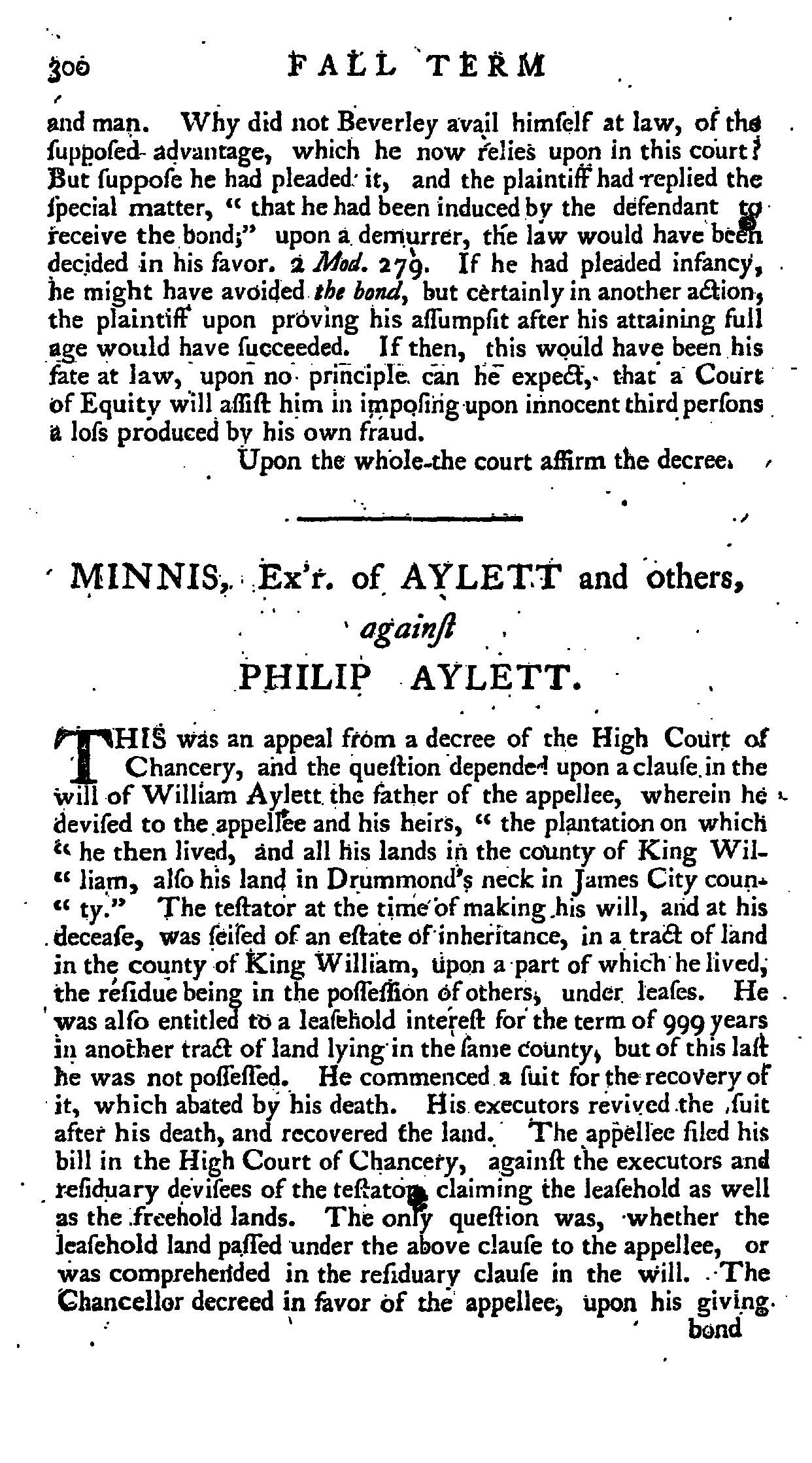Difference between revisions of "Minnis v. Aylett"
Mvanwicklin (talk | contribs) m |
m |
||
| (One intermediate revision by the same user not shown) | |||
| Line 1: | Line 1: | ||
{{DISPLAYTITLE:''Minnis v. Aylett''}} | {{DISPLAYTITLE:''Minnis v. Aylett''}} | ||
| − | [[File: | + | [[File:WashingtonMinnisvAylett1798v1p300.jpg|link={{filepath:WashingtonsReports1798V1MinnisvAylett.pdf}}|thumb|right|300px|First page of the opinion [[Media:WashingtonsReports1798V1MinnisvAylett.pdf|''Minnis v. Aylett'']], in [https://wm.primo.exlibrisgroup.com/permalink/01COWM_INST/g9pr7p/alma991017790129703196 ''Reports of Cases Argued and Determined in the Court of Appeals of Virginia''], by Bushrod Washington. Richmond: T. Nicolson, 1798.]] |
| − | [[Media:WashingtonsReports1798V1MinnisvAylett.pdf|''Minnis v. Aylett'']], 1 Va. (1 Wash.) 300 (1804),<ref>Bushrod Washington, ''Reports of Cases Argued and Determined in the Court of Appeals of Virginia | + | [[Media:WashingtonsReports1798V1MinnisvAylett.pdf|''Minnis v. Aylett'']], 1 Va. (1 Wash.) 300 (1804),<ref>Bushrod Washington, ''[[Reports of Cases Argued and Determined in the Court of Appeals of Virginia]]'' (Richmond: T. Nicolson, 1798), 1:300.</ref> is a case where the Court determined whether a tract of leased land was included in the testator’s will, and thus inherited by his son. |
==Background== | ==Background== | ||
Philip Aylett’s father, William Aylett, left a will leaving Philip his plantation, land in King William County, and Drummond’s Neck located in James City County. William Aylett was also entitled to additional land in King William County, which had been leased to a third party. While alive, William filed a suit to recover these lands and at his death, Minnis, William's executor, revived the suit and recovered the land. The question before the Court was whether the leased land was included in William’s will and therefore Philip's or if the lands passed by the will and remained an asset of the estate. | Philip Aylett’s father, William Aylett, left a will leaving Philip his plantation, land in King William County, and Drummond’s Neck located in James City County. William Aylett was also entitled to additional land in King William County, which had been leased to a third party. While alive, William filed a suit to recover these lands and at his death, Minnis, William's executor, revived the suit and recovered the land. The question before the Court was whether the leased land was included in William’s will and therefore Philip's or if the lands passed by the will and remained an asset of the estate. | ||
| + | |||
===The Court's Decision=== | ===The Court's Decision=== | ||
| − | The Chancellor found in favor of Philip Aylett. The Court of Appeals reversed. | + | The [[George Wythe|Chancellor]] found in favor of Philip Aylett. The Court of Appeals reversed. |
| + | |||
==See also== | ==See also== | ||
*[[Wythe's Judicial Career]] | *[[Wythe's Judicial Career]] | ||
| Line 15: | Line 17: | ||
__NOTOC__ | __NOTOC__ | ||
[[Category: Cases]] | [[Category: Cases]] | ||
| + | [[Category:Inheritance]] | ||
Latest revision as of 14:40, 29 March 2022

Minnis v. Aylett, 1 Va. (1 Wash.) 300 (1804),[1] is a case where the Court determined whether a tract of leased land was included in the testator’s will, and thus inherited by his son.
Background
Philip Aylett’s father, William Aylett, left a will leaving Philip his plantation, land in King William County, and Drummond’s Neck located in James City County. William Aylett was also entitled to additional land in King William County, which had been leased to a third party. While alive, William filed a suit to recover these lands and at his death, Minnis, William's executor, revived the suit and recovered the land. The question before the Court was whether the leased land was included in William’s will and therefore Philip's or if the lands passed by the will and remained an asset of the estate.
The Court's Decision
The Chancellor found in favor of Philip Aylett. The Court of Appeals reversed.
See also
References
- ↑ Bushrod Washington, Reports of Cases Argued and Determined in the Court of Appeals of Virginia (Richmond: T. Nicolson, 1798), 1:300.